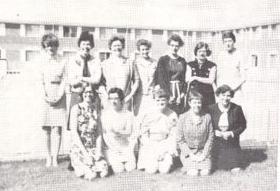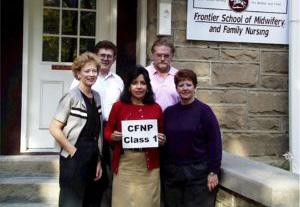
10 minute read
FNU News
FNU Celebrates 50
Dr. Joan Slager
Advertisement
-- Dr. Joan Slager, FNU Dean of Nursing
Dating to its inception, Frontier Nursing University has a long history of innovation borne out of necessity. Whether it was riding on horseback to provide care to families in Kentucky’s rural mountains or pioneering the first midwifery community-based distance education program in the United States, FNU has adapted to the needs of the communities its students serve.
In this the International Year of the Nurse and the Midwife as designated by the World Health Organization, FNU celebrates the 50th anniversary of one of its most significant contributions -- the nation’s first Family Nurse Practitioner (FNP) program.
“In the 1950s and early 1960s, due to a shortage in primary care physicians particularly in rural communities, nurses were recruited to assist physicians to meet the primary care needs in their communities,” said FNU Dean of Nursing Dr. Joan Slager, CNM, DNP, FACNM, FAAN. “Launching the FNP program was in alignment with FNU’s mission of educating providers to meet the needs of rural and underserved communities.” The process to launch the FNP program began in the late 1960s when FNU, then known as the Frontier Graduate School of Midwifery, recognized the primary care shortage and began providing a broaderbased education for nurses. The concept of educating its students to extend their abilities beyond traditional nursing and nurse-midwifery roles had long been a fixture of the FNU curriculum. The establishment of the FNP program, in essence, formalized the creation of a new nursing profession.
“The original nurses recruited in the 1920s for the Frontier Nursing Service were midwives and public health nurses, so providing care beyond maternity services was not at all unusual,” Dr. Slager said. “As the role of the nurse practitioner in the country was developed and formalized, FNU responded to meeting this need for primary care providers by launching the FNP program. The largest impact of the FNP program has been to ameliorate the primary care shortage in communities, particularly in rural and underserved areas.” Much like the Frontier Nursing Service nurse-midwives headed into the wilderness to care for families of rural Appalachia who had little or no access to medical care otherwise, today FNU graduates are providing much-needed care in remote regions all across the country where physicians are in increasingly short supply. One such locale is the Alaskan frontier, where the rugged mountainous terrain includes more than 3 million lakes and 3,000 rivers. Approximately 96 percent of the state’s landmass lies in Health Professional Shortage Areas, as identified by the Health Resources and Services Administration. Many of the remote residents travel into town only once or twice a year for supplies and, if needed, basic medical care.
Even in populated areas, such as Juneau, which has a population of more than 32,000, access to care is limited. David Moore, FNP, Class 75, works at the city’s Front Street Clinic, whose patients include a large segment of the city’s homeless population. As the only practitioner at the clinic, Moore is clearly filling what would otherwise be a vast void.
50 Years of the FNP Program
Dr. Lisa Chappell
-- Dr. Lisa Chappell, Chair, FNU Department of Family Nursing
“A lot of our patients are transient, and we only see them when some crisis arises,” Moore said. He credits FNU with instilling the mindset of going beyond what might be commonly expected of a nurse practitioner in order to take care of his patients. “FNU taught me to go above and beyond to get the job done.”
That has been the core of the FNP program since its inception. There is no one-sizefits-all skillset for FNPs. Every patient population, every clinic, every region has its own unique challenges. Preparing FNP students to adapt to those challenges and provide culturally competent care has been a staple of the program for 50 years.
FNU’s celebration of 50 years of the FNP program isn’t about an anniversary. It’s about celebrating 50 years of impact and the more than 2,600 FNP graduates who are, as Moore said, going “above and beyond to get the job done.” It’s also about recommitting to the next 50 years and continuing to address the nation’s healthcare challenges. “With the decline in the number of primary care physicians, there will be many Americans without a healthcare provider,” said Dr. Lisa Chappell, Ph.D., FNP-BC, CRNP, who is the Chair of the Department of Family Nursing at FNU. “The FNP program is well-equipped to play an important role in the future of our healthcare system.”
The model of care practiced by nursemidwives and nurse practitioners includes a partnership with the patient, a focus on promoting optimal health as well as treating illness. This model of care has a significant impact on improving long-term healthcare outcomes. A study on the
prevention of chronic disease published by the Centers for Disease Control* concluded that “across all conditions, NPs provide health education to patients more frequently than Physicians.” Decades of research indicate that primary care services provided by advanced practice nurses and nurse-midwives are safe and effective^. It is clear that working together, nurse-midwives, nurse practitioners, and physicians can attain the best outcomes for the people they serve.

“FNPs have a strong commitment to improving patient outcomes,” Dr. Chappell said. “As family nurse practitioners move into areas of increasing need, they provide holistic care to diverse individuals and families.”
*Ritsema TS, Bingenheimer JB, Scholting P, Cawley JF. “Differences in the Delivery of Health Education to Patients With Chronic Disease by Provider Type”, 2005–2009.
^The National Organization of Nurse Practitioner Faculties. “The Doctor of Nursing Practice Degree: Entry to Nurse Practitioner Practice by 2025.” May 2018.
Prominent Speakers, Important Discussion Highlight Sixth Annual National Midwifery Week Virtual Event
Frontier Nursing University joined thousands of nursemidwives across the country to celebrate National Midwifery Week from Oct 4-10. Throughout the week, FNU hosted its 6th annual virtual event, Empower, which explored how nurse-midwives can provide better care for women and families. The virtual event included a series of free sessions intended to share information and open discussion about the state of healthcare in America and the role of the nurse-midwife. Session: Midwifery Pearls Telehealth
Presenters: Faculty members Dr. Tanya Belcheff, DNP, CNM; Dr. Cassie Belzer, DNP, CNM; Dr. Judith Butler, DNP, CNM; Martha Harvey, MSN, CNM, OB/GYN NP; Heidi Loomis, MSN, CRNP, CNM; and Dr. Audrey Perry, DNP, CNM, CNE.
The session provided an overview of telehealth from a nurse-midwifery perspective, emphasizing patient engagement, group care, provider satisfaction, and best practices for meeting compliance requirements. “Midwifery Pearls of Telehealth” is a continuing education course approved for 1.25 contact hour(s) of continuing education by the American Association of Nurse Practitioners if the post-test and evaluation are completed by Sept. 2021.
Dr. Tanya Belcheff Dr. Cassie Belzer Judith Butler Session: Hot Topics in the Management of Perimenopause & Menopause: A Conventional & Integrative Approach

Presenters: FNU faculty members Dr. Ruth Ellen Elsasser, DNP, FNP-BC, CNE and Dr. Ana Verzone, DNP, FNPBC, CNM
This session, which was another continuing education opportunity, introduced a review of conventional and evidence-based integrative medicine interventions used during perimenopause and menopause. Some of the topics covered included: understanding menopause and its varied presentation and symptoms, knowing the critical differences between perimenopause and menopause, identifying complications of conventional pharmacology, and developing a patientcentered, individualized plan of care when managing perimenopause and menopause. Reviewing this session can earn participants 2.0 contact hour(s) of continuing education (which includes 0.75 hours of pharmacology) by the American Association of Nurse Practitioners after completing the posttest and evaluation. The course will be recognized through Sept. 2021.
Heidi Loomis Dr. Audrey Perry
Dr. Ruth Ellen Elsasser Dr. Ana Verzone
Session: Racial Disparities in Maternity Care: Where Do We Go From Here?
Presenters: FNU Assistant Professor Dr. Heather Clarke, DNP, CNM, APRN, FACNM, and FNU President Dr. Susan Stone, CNM, DNSc, FACNM, FAAN
This session discussed how high maternal and infant mortality rates are directly correlated with racism and how the nursing community can use strategic planning to rebuild these systems and enact real change. The session was designed to help nursemidwives identify disparities in Black and indigenous women’s health care outcomes and apply real strategies to combat racism and improve outcomes. Session: Get the 411 on Becoming a Nurse-Midwife
Presenters: FNU faculty Jeneen A. Lomax, DNP, APRN, CNM, and FNU Department Chair of Midwifery and Women’s Health Dr. Tonya Nicholson, DNP, CNM, WHNP-BC, CNE, FACNM
Student Panelists: Jamilla Webb, BSN, RN; Sunoz “Sunny” Soroosh; RN, MPH, Erin Hanks, RN, IBCLC; and Cheryl Appleton, BSN, RNC-OB, C-EFM

During this session, Dr. Lomax and Dr. Nicholson discussed the value of midwifery and then listened to a panel of current FNU students about their experiences. In the session, the presenters and panelists came from a variety of personal and healthcare backgrounds to best present the full scope of nurse-midwifery. The session finished with a question-and-answer session involving the session attendees.

Dr. Heather Clarke President Dr. Susan Stone
Jeneen A. Lomax Dr. Tonya Nicholson
Student Panel:
Jamilla Webb
Sunoz “Sunny” Soroosh Erin Hanks
Cheryl Appleton

Mental Health, Telehealth, and Implicit BiasTopics Headline National Nurse Practitioner Week Virtual Event Sessions
Session: Pharmacology CE – Anxiety in Children and Adolescents: Trends in Treatment
Presenter: Dr. Billinda Tebbenhoff, DNP, PMHNP-BC, PMHCNS-BC
This session discussed the approximately 4.4 million children and adolescents in the United States (CDC, 2020) who meet diagnostic criteria for an anxiety disorder and the many more who remain undiagnosed. Though anxiety and stress are an expected part of the human experience, consistently elevated anxiety can interfere with a child’s sense of self and impact the entire family. The implications of the current pandemic related to child and adolescent anxiety are beginning to emerge and depend on the child’s stage of development and pre-pandemic functioning. Predictive trends and guidance regarding helping children, families, and communities during the pandemic were all discussed. Session: Nurse Practitioners Leading Care Through Telehealth
Presenters: Dr. Jess Calohan, DNP, PMHNP-BC; Martha Harvey, MSN, CNM, OB/GYN NP; Dr. Rachel Mack, Ph.D., DNP, APRN, C-FNP, CNE; and Dr. Vicky Stone-Gale, DNP, APRN, FNPBC, FAANP
This session included a panel of FNU nurse practitioner faculty members who discussed the rise of telehealth use in their respective specialties. Panel members represented family nursing, psychiatric-mental health, nurse-midwifery, and women’s health departments within FNU. The panelists shared current telehealth trends along with their professional experiences using telehealth as a patient care delivery model and the effects it could have on the future of healthcare. Session: Dismantling Implicit Bias to Promote Optimal Health Outcomes
Presenters: Dr. Katheryn Arterberry, DNP, APRN, FNP-BC; Dr. Lisa Chappell, Ph.D., FNP-BC, CRNP; and Dr. Diane John, Ph.D., APRN, FNP-BC, CNE
This session focused on the negative impact of implicit bias in optimizing health outcomes. Advanced practice nurses identified new processes for changing attitudes and behaviors that can lead to health disparities and move towards equality throughout the healthcare system. The session encouraged participants to engage in reflective and introspective thoughts leading to individual plans for minimizing personal biases.
Recordings of each of the sessions from FNU’s Empower 2020 can be found at
https://fnudigitalsummit.com/.
Dr. Billinda Tebbenhoff Dr. Jess Calohan Martha Harvey Dr. Katheryn Arterberry Dr. Lisa Chappell
Session: Becoming a Nurse Practitioner: A Journey in Distance Education
Presenters: Dr. Paula Alexander-Delpech, Ph.D., PMHNP-BC, APRN and FNU Chair for the Department of Family Nursing Dr. Lisa Chappell, Ph.D., FNP-BC, CRNP
Student Panelists: Hailey Baker, RN, MSN; Timonthy Black, RN; Michele Morgan, RN, PMHNP; and Genevieve Utley, FNP, RN
Designed to enlighten current nurse practitioner students or anyone interested in becoming a nurse practitioner, this session offered a 360-degree view of FNU’s distance education program. A panel composed of current students from FNU’s family nurse practitioner, psychiatric-mental health nurse practitioner, and women’s healthcare nurse practitioner tracks gathered to share their personal experiences as graduate-level nursing students in an online program.
Dr. Paula AlexanderDelpech Dr. Lisa Chappell

Student Panel:
Hailey Baker Timonthy Black Michele Morgan Genevieve Utley









